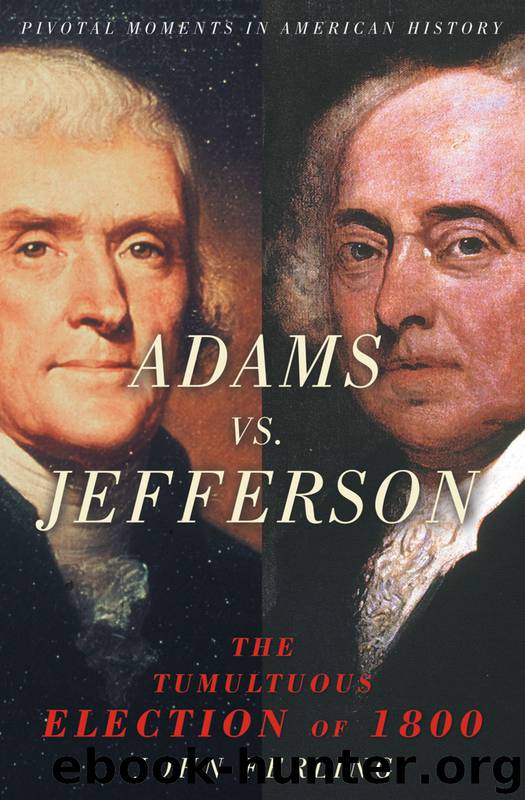Adams Vs. Jefferson : The Tumultuous Election of 1800 by Ferling John

Author:Ferling, John
Language: eng
Format: epub
Publisher: Oxford University Press
Published: 2004-10-31T16:00:00+00:00
10
“The Boisterous Sea of Liberty”
The Campaign of 1800
CAMPAIGNING IN 1796 had not begun until Washington announced his intention to retire, about a hundred days before election day. Things were different in the election of 1800. “Electioneering is already begun” in the capital, Abigail Adams noted in November 1799, thirteen months before election day.1 Indeed, around this time Pennsylvania’s senator James Ross introduced legislation to create a “Grand Committee”—it was to consist of the chief justice of the United States and five members of Congress—to adjudicate any disputes in the election of the president. As the chief justice was a staunch Federalist, and as that party controlled both houses of Congress, Ross’ bill seemed to many to be an attempt by the Federalists to steal the election. The bill went nowhere, but its introduction and the Republican response to it—one who was close to Jefferson labeled it a “deadly blow … aimed at us”—was a signal that the presidential contest was under way.2
So too was the publication a few weeks later of James Callender’s The Prospect Before Us. A Scotsman with a poison pen, Callender had been forced to flee to Ireland, then in 1793 to Philadelphia, to avoid arrest for his writings. The pamphlet that got him in trouble in the old country—an assault on the British constitution—had been read with delight by Jefferson while he was secretary of state. Jefferson also savored Callender’s subsequent work, especially when he not only lashed out at Hamiltonianism but broke the story in 1797 that while Treasury secretary, Hamilton had been involved in an extramarital affair with a married woman and supposedly—it was never proven—provided her husband with public monies and insider information to purchase his silence. Thereafter, Jefferson visited Callender in his lodging and agreed to underwrite additional malicious squibs. Soon other Republicans with deep pockets came forward, likely at the behest of Jefferson, to bankroll the journalist. Calumny dripped from Callender’s pen in several essays that he wrote during the next year. He unsparingly flayed Washington as a liar who longed to be a dictator. He called Hamilton “the Judas Iscariot of our country” and charged that he was a monarchist willing to sell out the United States to Great Britain. Callender depicted Adams as a warmonger and a “poor old man” who was “in his dotage.” The Federalist Party, he said repeatedly, was the foe of the rights of man.3
Callender’s hatchet jobs soon landed him in trouble. On two occasions thugs visited his apartment, terrorizing his family and curtailing his literary productivity. The Sedition Act stopped it altogether. Broke and frightened—and a widower as well, as during his idleness his wife had died (in slovenly conditions, it was rumored)—he fled Philadelphia for Virginia. He was so poor that he was compelled to walk from Pennsylvania to below the Potomac. One object that he had in mind in coming south, he said, was to find a new wife, a “hearty Virginia female” who could “fatten pigs, and boil hominy, and hold her tongue.
Download
This site does not store any files on its server. We only index and link to content provided by other sites. Please contact the content providers to delete copyright contents if any and email us, we'll remove relevant links or contents immediately.
The Secret History by Donna Tartt(16699)
The Social Justice Warrior Handbook by Lisa De Pasquale(11501)
Thirteen Reasons Why by Jay Asher(7821)
This Is How You Lose Her by Junot Diaz(5813)
Weapons of Math Destruction by Cathy O'Neil(5066)
Zero to One by Peter Thiel(4854)
The Myth of the Strong Leader by Archie Brown(4803)
Promise Me, Dad by Joe Biden(4466)
Beartown by Fredrik Backman(4455)
How Democracies Die by Steven Levitsky & Daniel Ziblatt(4438)
Stone's Rules by Roger Stone(4431)
The Fire Next Time by James Baldwin(4360)
100 Deadly Skills by Clint Emerson(4101)
A Higher Loyalty: Truth, Lies, and Leadership by James Comey(4049)
Rise and Kill First by Ronen Bergman(4035)
The David Icke Guide to the Global Conspiracy (and how to end it) by David Icke(3903)
The Farm by Tom Rob Smith(3888)
Secrecy World by Jake Bernstein(3798)
The Doomsday Machine by Daniel Ellsberg(3745)
